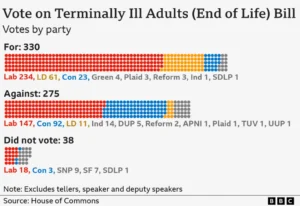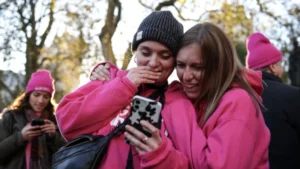Tears, hope and fear as assisted dying bill passed
While MPs debated the bill in parliament, supporters and opponents gathered outside.
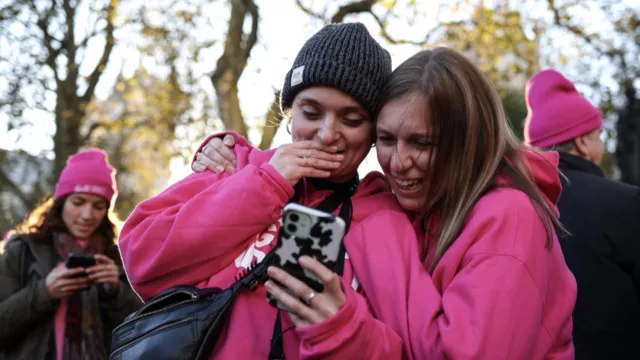
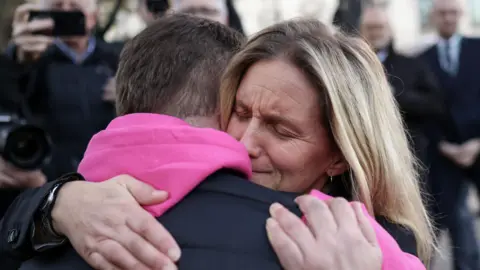 EPA
EPAOn Friday, after weeks of fierce and passionate debate, MPs began their formal scrutiny of the bill that would allow terminally ill adults expected to die within six months to seek help to end their own life.
It was a day of tears, hope, relief and fear. This is the story of how it unfolded inside and outside of parliament – and how Labour MP Kim Leadbeater secured a historic win for her proposed law.
It is nine in the morning. The MPs’ debate hasn’t started yet but campaigners on both sides are already gathering outside the Houses of Parliament.
Those in favour of Leadbeater’s bill are on the west side of Parliament Square, by the statue of activist Millicent Fawcett.
It is a sea of pink hats and pink jumpers, provided by the Dignity in Dying group.
Amanda, whose surname we are not using as with many of our other interviewees, has come from Brighton to be here. She has cared for people in their final stages of their life, including one friend with cancer.
She remembers her friend pleading with her to “kill me now, kill me now”. “That’s an awful thing for someone to hear their loved ones say.”
Another women called Sue is here, also wearing a pink hat. “I think this could be a momentous day,” she says.
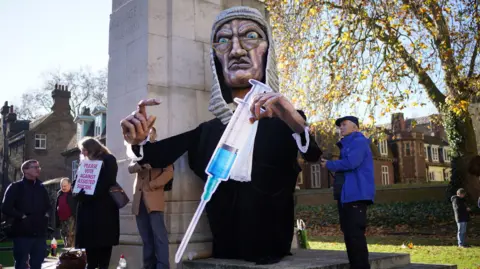 PA Media
PA MediaAround the corner, less than a minute’s walk away on College Green, those opposed to the bill are also gathering.
They are joined by a 10ft-tall puppet of a severe judge, holding a giant syringe and pointing a condemning finger into the air.
“Kill the bill, not the ill,” they chant.
Hannah is a little further back, looking on and puffing on a lemon meringue pie-flavoured vape.
She fears the bill will change the way disabled people are viewed but is also thinking about her father.
“He was given six months but ended up living for four years,” she says. “Living those four years meant he was able to meet his grandchildren.”
More on assisted dying:
Nearly everyone at both demonstrations has a personal tale; a personal reason for being in Westminster on Friday.
Jane cared for her mother in her last years. She says that time was difficult but also “very precious” to her.
She thinks the bill would push people like her mum into asking for an assisted death.
“I know a judge would be involved in deciding these things but how can they tell what is in someone’s soul?” she says.
“Someone can say with their mouth that they want to die, but how can a judge know what is really going on inside their head.”

Meanwhile, inside parliament, after weeks of discussion, Labour MP Kim Leadbeater opens the debate of her bill.
Leadbeater is the MP for Spen Valley, an area previously represented by her sister Jo Cox, the MP who was assassinated in 2016.
The atmosphere is generally contemplative, thoughtful and respectful, but outside of Parliament tempers are starting to fray.
The two sides have mostly kept to their separate areas but at the gates of parliament, some campaigners are starting to clash.
One woman, in favour of assisted dying, holds up harrowing pictures of her father who is still alive but dying and in pain.
She points to parliament and then to the pictures. “I want someone in there to tell me why that is OK,” she says.
A woman nearby holds a placard opposing the bill. It reads: “NHS: It’s cradle to grave, not ’til old, inconvenient or expensive.”
“Your sign is offensive,” shouts the first woman at the second. “Are you telling me I don’t care about my father.”
A few steps away, another woman is wrapped up in a thick scarf and a woolly hat pulled so far down only a small section of her face is showing.
She holds her own placard, opposing the bill, and fingers a light blue rosary necklace.
“How many people have you watched die,” a man passing by asks her.
Away from the noise and drama, Dennis is rolling a cigarette, keeping warm in one of the last remaining patches of winter sunlight.
She has travelled from northern England. Pointing at the sun, she says: “That’s a good idea, we need to get one of those in Manchester.”
Dennis is strongly against the bill but still has sympathy for the MPs. “I wouldn’t want to be them,” she says. “Whatever they do, someone if going to be very unhappy.”
Lal, from London, agrees. “I do think, I do believe everyone who has been talking about this wants to be compassionate and wants people not to suffer,” she says.
“That is the common ground.”
Back in the House of Commons, the debate is well under way.
Conservative MP Kit Malthouse argues against suggestions from others that the bill should be opposed because it would put a burden on the NHS and the courts.
“Are you seriously telling me that my death, my agony, is too much for the NHS to have time for?” he says.
“That I should drown in my own faecal vomit because it is too much hassle for the judges to deal with?”
One Labour MP makes their decision to vote for the bill during the debate.
“Kit Malthouse was very powerful,” they say.
“I reserve the right to oppose it at a later stage and I really mean it.”
They add that many MPs might change their minds later if “the safeguards aren’t strong enough”.
The debate concludes at around 2:15pm and MPs file out of the chamber to vote.
Leadbeater lingers on the government benches, near to one of the entrances to the ‘aye’ lobby, giving out final words of encouragement to wavering MPs.
She embraces Solicitor General Sarah Sackman, and Marie Tidball, a disability campaigner who revealed during the debate that she was supporting the legislation after a long period of reflection.
Sir Keir Starmer arrives in the chamber flanked by Welsh Secretary Jo Stevens, and his parliamentary private secretary, Chris Ward, both of whom voted in favour.
He walks over to the opposition benches to have a long and seemingly warm conversation with Reform’s Nigel Farage. They are later joined by Conservative veteran David Davis.
MPs filing through the ‘aye’ lobby know towards the end of the voting that they have won.
Thanks to a relatively recent innovation, a screen updates in real time with the number of people voting that way.
It is striking that there is complete silence in the Commons as the tellers come in to announce the results.
Lucy Powell, Leader of the House of Commons, has to nudge Sarah Owen, one of the ‘aye’ tellers, to stand on the correct side to indicate that Leadbeater’s bill has passed.
Ahead of the debate, Sir Keir hadn’t said how he would vote, although there was an assumption, given his past record, that he would be in favour.
A Labour MP who opposed the bill says this would have been a factor in how some members of his party voted.
“You can’t underestimate the power of following the prime minister into his division lobby, even if it was a free vote,” they say.
“And lots of people were watching to see which way the wind was blowing overall.”
 EPA
EPAOutside parliament in the pro-camp, everyone is glued to their phones waiting for the result.
Time delays mean some get the news before others. A quiet ripple grows into a loud roar.
Huge grins and long hugs are exchanged between the supporters.
“I just crumpled,” says Catie.
Others are thinking of deceased relatives. “Granny would be rooting for us,” says Kate. “She didn’t want others to suffer in the way she did.”
Iona’s mother died when she was 13. “It wasn’t the death she wanted,” she says, adding that her mother would have been so proud of the result on Friday.
There is joy but also relief, as well as an understanding that this is just the first step in a long parliamentary process.
Catie also says there needs to be an effort to try and address people’s concerns about the bill.
As the campaigners celebrate, the bells of St Margaret’s Church begin peeling.
It has nothing to do with the vote, of course. A couple have just got married and are leaving the church.
But for the pro-camp, it feels symbolic, and they cheer along with every chime.
On the other side of Parliament Square, Anna is standing alone.
Her eyes are full of tears and she struggles to speak. “I feel like today a line has been crossed,” she says.
Jane is leaving the area. She is off to meet her daughter and feels a bit more upbeat than Anna.
“It is sad, but not as bad as we feared – 270 MPs voted against it,” she says. “There was some resistance.”
Matthew is still at College Green. Using a tablet computer to communicate, he says he is thinking about the other children he went to school with who had severe disabilities.
“My friends deserve to live as much as anyone else,” he says. “Gradually lives like mine risk being devalued. [The bill] opens a very dangerous door.”
As he talks, vans have arrived and the campaign’s bits and pieces are being packed away around him.
The 10ft puppet judge is lying crumpled on the floor, his finger pointing up at the sky.


